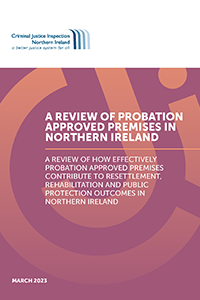
A Review of Probation Approved Premises in Northern Ireland
Probation Board approved premises in Northern Ireland provide a safe place for offenders who need additional supervision to manage their risks to the public immediately following their release from prison, according to a new report published today (31 March 2023) by Criminal Justice Inspection Northern Ireland.
The Review looked at how effectively the seven Probation Board for Northern Ireland approved premises or hostels operating across Northern Ireland were contributing to resettlement, rehabilitation and public protection outcomes.
“Approved premises play a vital role in our community and provide an invaluable service to the criminal justice system in terms of public protection, monitoring the behaviour of residents and supporting enforcement action when needed,” said Jacqui Durkin, Chief Inspector of Criminal Justice in Northern Ireland.
“Having a home on release from custody is one of the key elements that can support men and women leaving prison to stop offending and contribute to their rehabilitation.
“As part of this Review Inspectors visited each of the approved premises and spoke to residents and staff. We looked at how the hostels, which are run by community and voluntary sector organisations, operated from when a prisoner was first considered for placement to the time they left,” said Ms Durkin.
“We found staff working in approved premises were highly committed to the work they were doing and day-to-day practice was good. We also found evidence of effective partnerships and collaboration between the approved premises and local Probation Officers, Police Officers, Northern Ireland Housing Executive staff and others,” she continued.
Inspectors found that when fieldwork was conducted demand for approved premises places was high and there was no strategic analysis of the demand for the service. Decisions about where an offender would be placed were being taken close to their planned release date and allocations were being mostly based on where a bed was available.
“This could impact on the processes in place to support their transition from custody, such as continuity of health care and access to medication, registering with a GP, opening a bank account or applying for benefits,” said the Chief Inspector.
Inspectors identified that while initial risk assessments were completed on admission to the approved premise and needs and support plans were in place for residents, they did not find strong evidence of how this information linked to Probation case plans and the current risk profile of the individual.
“Staff in approved premises are interacting with their residents every day so it is important they know the current risk profile to enable them to better contribute to Probation case plans, public protection arrangements and inform resettlement work,” she said.
“However, they are meant to be a place of transition – not a permanent home or a sticking plaster for a housing shortage or effective risk management in the community,” said Ms Durkin.
“The lack of sustainable long-term accommodation is hampering efforts to successfully support men and women to move on from approved premises when they are no longer required to live there for risk management purposes.
“We have made one strategic and three operational recommendations for improvement in this Review to help enable approved premises develop their services and both strengthen and formalise the important contribution they make to the criminal justice system,” concluded the Chief Inspector.